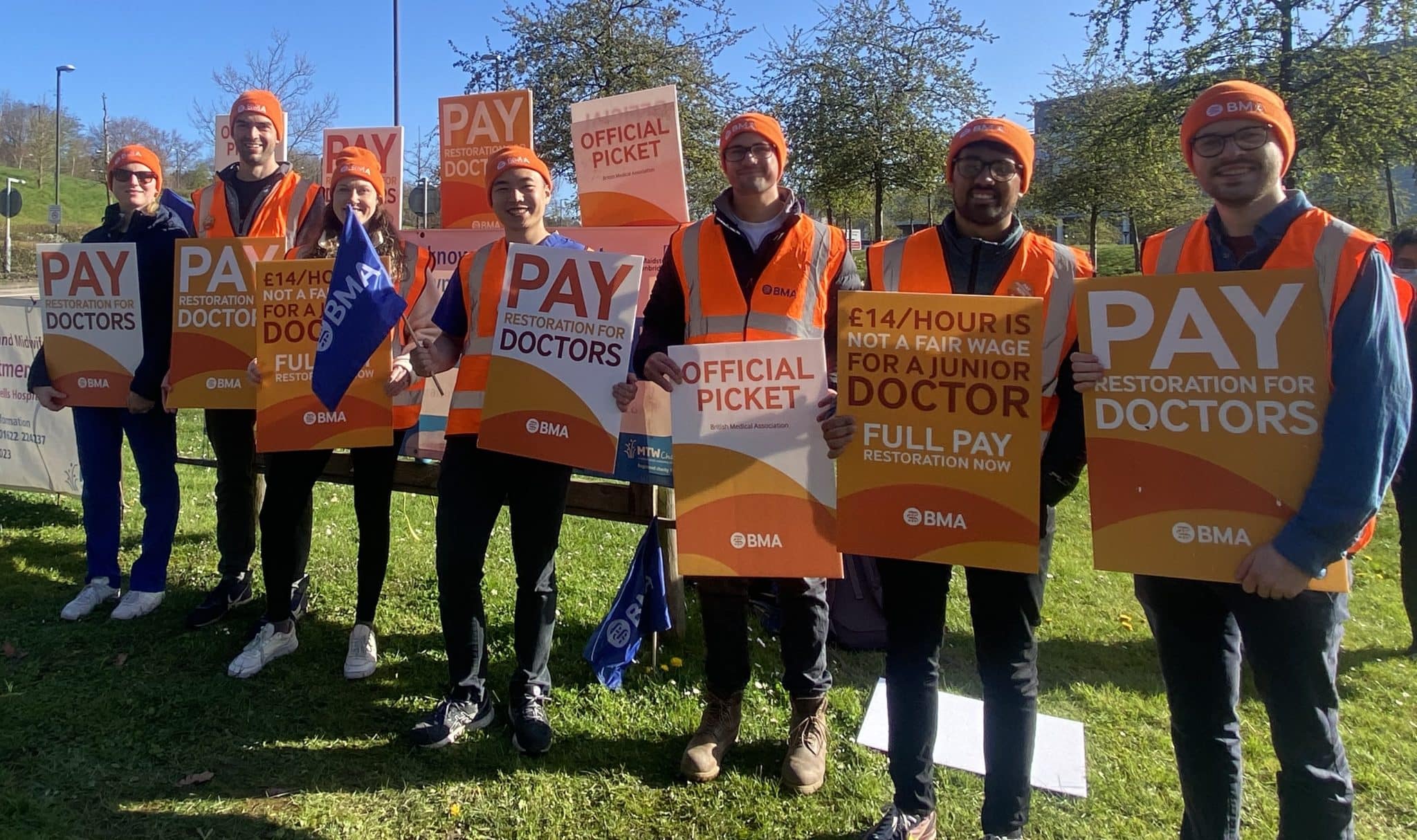THOUSANDS of hospital patients and school students in Tunbridge Wells are likely to be impacted by further strike action this month, as both doctors and teachers walk out over pay and working conditions.
Patients attending hospital appointments this week face disruption as junior doctors from Maidstone and Tunbridge Wells NHS Trust (MTW) continue into their second day of a 96-hour walk out.
Dr Ishani Rao, a junior doctor at MTW said: “We are striking again because, unfortunately, there was no effort made by the Government to improve working conditions, to achieve the pay restoration that we work hard for, or to ensure long-term systematic changes to achieve patient safety.
“It’s been pretty morally conflicting for a lot of us, but I believe that we need to take a stand to say that current conditions are completely inadequate.
“I hope that the Government realises how valuable we are to the healthcare system and that we should be invested in properly in order to retain junior doctors.”
The strike is expected to impact a quarter of a million appointments this week following the first 72-hour walk out in March which saw 175,000 hospital appointments disrupted.
The British Medical Association (BMA) said that junior doctors have seen a real-term pay cut of 26.2 per cent since 2008, and it is asking for a 35 per cent pay increase to achieve pay restoration.
On March 23, the BMA announced further strike action would take place, from 7am on Tuesday April 11 until 7am on Saturday April 15, after talks with the Health Secretary failed to present a “credible offer” to the doctors’ union.
Dr Vivek Trivedi and Dr Robert Laurenson, Co-chairs of the BMA Junior Doctor Committee, said: “It is with disappointment and great frustration that we must announce this new industrial action.
“The Government has dragged its feet at every opportunity. It has not presented any credible offer and is refusing to accept that there is any case for pay restoration, describing our central ask as ‘unrealistic’ and ‘unreasonable’.”
But the Government has said that the demands from the union are ‘unacceptable’ at a time when people are struggling with the cost of living.
Speaking to the House of Commons on March 30, Steve Barclay, Secretary of State for Health and Social Care said: “The BMA’s Junior Doctors Committee’s refusal to engage in conversations unless we commit to delivering a 35 per cent pay increase is unacceptable at a time of considerable economic pressure and suggests a leadership that is adopting a militant position, rather than working constructively with the Government in the interests of patients.”
The union has also come under criticism for their choice of dates, which started directly after the Easter weekend, resulting in a total of 10 days when already limited NHS staff were stretched across departments.
MTW said: “This is four days of strikes involving up to half of doctors in the NHS coming immediately after a four-day bank holiday weekend.
“The NHS is facing record demand, and the long bank holiday weekend is usually one of the busiest times for the NHS, with staff working incredibly hard to maintain services.
“We are working hard to prioritise resources to protect emergency treatment, critical care, neonatal care, maternity, and trauma, and [we] ensure we prioritise patients who have waited the longest for elective care and cancer surgery.
“We will only reschedule appointments and procedures where necessary and will rebook immediately, where possible. Unfortunately, these strikes will have a significant impact upon planned and routine care.”
In response to the strike days Dr Rao said: “There is never going to be ideal timing for a large-scale walk-out like this, but I hope that this makes the general public and Government appreciate junior doctors and our work. Departments are already stretched so this is an environment that we’ve been used to for a long time.”
As doctors’ strikes continue until the end of this week, teachers at schools across Tunbridge Wells are preparing to walk out of classrooms on April 27 and May 2, after rejecting the Government’s pay offer last week.
Almost 200,000 members of the National Education Union (NEU) voted overwhelmingly (98 per cent) against Education Secretary, Gillian Keegan’s offer of a £1,000 one-off payment and a 4.5 per cent pay rise next year.
Tom Hoskins, NEU Joint Secretary for West Kent, told the Times: “It is not surprising that the offer has been rejected. The offer was not fully funded, meaning teachers in England would see their pay fall even further behind their counterparts in Wales and Scotland.
“It would represent accepting an additional two years of real-term pay cuts, and it would do nothing to reverse the problems of recruitment and retention.
“As before, the announcement of strike days is to get the Government to the negotiating table. We should not have needed four days of strike action to meet, as we do not need to take these two days of action, but this Government would not meet before we followed through with four days of action.
“The next days of action are still over three weeks away. That is ample time for the Government to take note of the strength of feeling within our and other education unions, and to meet to discuss an improved offer that addresses the points listed above to have a realistic chance of being accepted.”
Thousands of students across the Borough are expected to be impacted by the strikes in the run up to their end-of-year exams. An estimated 7,000 students were affected by strikes last month.
Teachers have been asking for a fully-funded pay rise above inflation.








